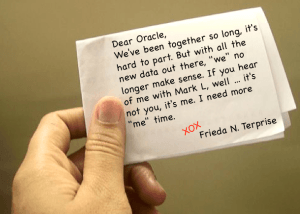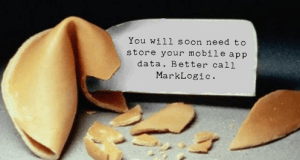I recently attended the webinar When Relational Databases Aren’t Enough. Hosted by MarkLogic’s Matt Allen, and his guests, John Myers Managing Research Director at Enterprise Management Associates (EMA) and Jim Driscoll, principal technologist at MarkLogic – this insightful webinar was targeted toward attendees of Oracle Open World 2014 and anyone else, myself included, curious about the differences between RDBMS and Enterprise NoSQL. According to John Myers, relational databases aren’t going anywhere, but the technology does have inherent limitations for organizations needing a data platform capable of handling the new types of data sources that power the Internet of Things. So, what are these limitations?

Recognize the Shortcomings of Your RDBMS
Given just the right circumstances, relational databases can still get the job done. An RDBMS might work wonderfully when:
- You understand the data relationships in advance
- The schema doesn’t change
- The data fit on one machine
- A separate disk-seek is acceptable for every join
But as many of us have learned (the hard way), the planets rarely seem to align in favor of our organizational objectives. So, in light of our human frailties and lack of prognostication abilities – relational databases fail to provide ideal solutions for the challenges presented by the wide-variety of changing data that organizations must work with today.
Embrace Your Need for Speed

We want what we want. Going with the assumption that deep down there might be a touch of Veruca Salt in all ofus, it’s no surprise that when you query your database, you expect results yesterday. And you’re not alone. In fact, according to EMA, faster query response weighs heavily on the minds of most business users.
Top Five Business Drivers for Change
- Faster query response time – 39.4%
- Increased operational efficiency during offer, design and production – 38.6%
- Grow competitive edge with flexibility of data used in solutions – 34.0%
- Improve intelligence about customer buying behavior – 32.8%
- Business requirements for higher levels of advanced analytics – 30.9%
Source: EMA With the world changing at the speed of thought – it’s not too far-fetched to expect near instantaneous results to queries. And in terms of speed of deployment, instead of waiting the 12 to 18 months required by RDBMS to gather all the necessary components to create a new data schema, with MarkLogic you can move forward with your configuration and implementation in just a matter of weeks. You’ve got the need for speed, so why let RDBMS hold you back?

To name a few of the specific features that separate it from your traditional relational data platform and enable you to work your data more efficiently, MarkLogic provides:
- Easy searchThere’s no need to know where data is located – you can always find it
- Schema agonistic platformNo need to concern yourself with the variety and type of data being ingested
- Massive scalabilityAbility to link multiple commodity servers in a cluster
- Faster time to resultsQuickly query across disparate, heterogeneous data for faster application development
Choose Your Next Tech Partner Wisely
All NoSQL solution providers attempt to solve the problems presented by unstructured data. However, MarkLogic is unique in that it provides an enterprise-level NoSQL solution, meaning that it includes enterprise proven capabilities such as ACID transactions, government-grade security and the ability to search across large volumes of data quickly – all essential functions at the organizational level.
Other NoSQL databases have embraced the idea of data access at all costs – even if that data is no longer current. Understandably, this practice doesn’t work well on the enterprise level and is one of the reasons MarkLogic is ideally designed for organizational use. By ensuring ACID transactions, MarkLogic ensures that the data you see is going to be as consistent across every view of the database. as it would be in a relational database.
And as for government-grade security, we’re certified to work in top-secret installations within the U.S. government, sometimes exclusively. We offer replication, high availability and flexible, elastic scalability that enables you to scale up with a number of nodes and back down for cloud applications.
MarkLogic also offer semantics, the ability to have a full triple store in conjunction with your document database. All of which empowers you to quickly take your enterprise data to infinity and beyond.
Not your grandfather’s database, MarkLogic is the standard bearer for the paradigm shift in the database world. Our new generation of database advances rapid application development – by handling any volume and velocity of data and eliminating the months of planning and data modeling required by a traditional RDBMS – giving you more time to get back to the things you do best at work …


